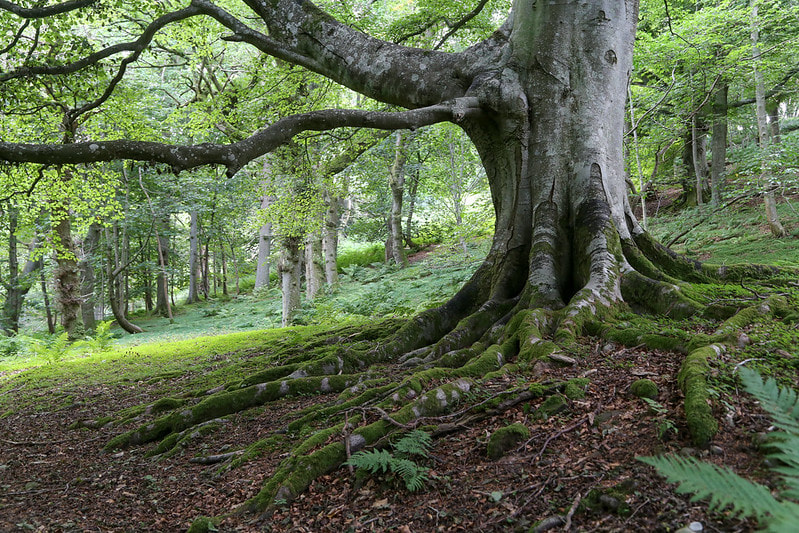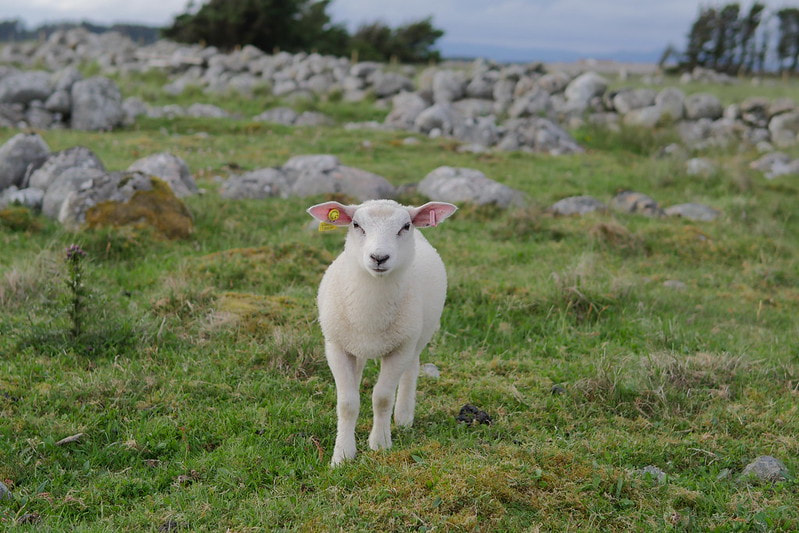|
What a treat I had on Wednesday morning! I always sit on my sofa so that I can look out at our deck and the Sugar Maple that sits in front of it. Because we live in a second-story condo I am privileged to see all the birds that come to rest in the branches of the tree. The Lord knows how much I enjoy His winged creatures, and on this day, He was going to put on an outstanding show for me.
For quite some time, the Maple has hosted the Downy Woodpecker. This particular morning two came to hammer at the dying branches in search of worms. They stayed so long that my guess is that they must have found food. In addition, they were joined by a large, Red-bellied Woodpecker. I have not seen one of these so closely before. It was a thrill for me to watch all three birds at work. The larger woodpecker did not stay long, but the others were joined by two Black-capped Chickadees. They came looking for a drink. Only the very edge of my birdbath provided a small amount of refreshing since most of the water is frozen. But then they made a discovery! The Sugar Maple sits on the south side of our building. As the sun shines on it in the wintertime, the sugary sap begins to run. It seems to be running early this year. So many holes have been tapped into this Maple by the woodpeckers that the sap is dripping out of the branches. The Chickadees clung to the small branches and placed their beaks just below a hole so that they could capture the watery sap. As all this was going on a flock of robins flew onto the ground below to peck the frozen ground. Two of the birds left the flock and came up to sharpen their beaks on the Maple branches. They do this by moving their heads from side to side. In the process they discovered the potted Japanese Holly I have on our deck. It is loaded with small, round, blue-black berries. Using their just-sharpened beaks, they began to pick the berries off the bush to consume them. If all this was not enough, my final visitors were sparrows who sang me a pretty song. The Spirit of God always has a lesson for me from nature, and I knew this was the case on Wednesday. Sadly, my Sugar Maple has been slowly dying. My guess is that it was planted improperly some thirty plus years ago. I inspected its roots several years ago and found they are not spreading at the base as they should be. This would indicate that the roots are restricted. The Maple has put up a good fight over the years but appears to only have a few years of life remaining. However, in its dying, this tree is imparting life. It gives the birds a resting place, a branch for sharpening their beaks, food, and sweet water. It stands as a life-giving testimony of imparting life in death. I am reminded of our Savior, Jesus the Messiah. He came to earth to give all people life through His death. He died on a cross called "a tree." Everyone is welcome to partake of the life He offers through our acknowledgement of what He did for us. Here is what the prophet Isaiah has to say about Him: "He was pierced for our transgressions, He was crushed for our iniquities; the punishment that brought us peace was on Him, and by His wounds we are healed." (Isaiah 53:5) We have been given so much through the sacrifice of the Lord! The apostle Paul prayed for his brother in the faith, Philemon, this way: "I pray for you that the faith we share may effectively deepen your understanding of every good thing that belongs to you in Christ." (Philemon, Verse 6 - TPT) I pray this for you and that you will remember how my dying tree provides life for the birds who come to it as Christ dying on the "tree" provides life for all of us who believe in Him. Yearly, on the 15th of Shevat, the Israelis celebrate the "New Year of the Trees" or TuBi Shevat. The day is commemorated as Israelis spend time planting trees. When the Jewish pioneers came to the land of Israel, they found parts of it void of trees. Their decision to plant the naked landscape has produced much fruit.
In Scripture we see that people are compared to trees. The Lord calls us to look to our roots and to recognize our identities through Him and the Jewish people. "Blessed is the one who trusts in the Lord, whose confidence is in Him. They will be like a tree planted by the water that sends out its roots by the stream..." (Jeremiah 17:7-8) In both the natural and spiritual realms roots are of critical importance. Tree roots anchor a plant, keeping it in place. It is through the roots that a tree is established. Roots are like the foundation of a building: The stronger the foundation, the more secure the top. Tree roots also serve the function of holding the soil around them together and preventing erosion when heavy rains come. The tree with the strongest and healthiest root system will grow the fastest and produce the best top. Roots are the lifeline for a plant as they absorb water, minerals, and nutrients from the soil and disperse them to the branches and leaves above. Healthy soil that is moist but well drained and rich in organic matter is a necessity for healthy roots that function properly. At times, a tree's roots secrete compounds into the soil that affect its microorganisms, helps protect the plant from disease, and encourages the absorption capabilities of the roots. In addition, roots have the capacity to store nutrients and food for any future needs of the tree. If the ground around the tree freezes, the roots can still release what is stored to the top. When we look at roots from a spiritual perspective those who know and love the Lord are encouraged in the Bible to plant themselves by rivers of living water so that they can grow up to be like the mighty oak tree of righteousness, a "planting of the Lord for the display of His splendor," that is written about in Isaiah 61:3. We, like the tree planted by streams of water, are called to bear fruit. As we see in Jeremiah 11:16, the Lord referred to His people as a "thriving olive tree." It is through the line of Abraham that the Church inherited the promises of God. Paul's discourse to the Romans in Chapter 11 explains how Jews and Christian Gentiles are represented by different types of olive trees. Jews are represented by the cultivated olive tree while Gentiles come from the wild olive tree. The Lord willingly makes room on the cultivated tree for the branches from the wild tree (Gentile Believers) to be grafted in by removing the "rebellious" branches of the cultivated tree. The roots of the Christian faith are firmly established in the Hebraic soil of Judaism. Christianity was birthed through Judaism. God established His covenant through the linage of Abraham that includes David and Jesus, who is called "The Root of David." And it is through Jesus Christ that we become joint heirs of God's promises. Our spiritual identity comes from our Jewish roots. Paul called this a "mystery" in Ephesians 3:16. "This mystery is that through the gospel the Gentiles are heirs together with Israel, members together of one body and sharers together in the promises in Christ Jesus." In Galatians 3:29 he says, "If you belong to Christ, then you are Abraham's seed, and heirs according to the promise." Since we know the function and benefit of healthy roots naturally, how should this impact us spiritually? I believe that the Church, for the most part, has disconnected from its Hebraic roots. How is she surviving? She must quickly reconnect with her roots. This can be done by improving the "soil" around her. The Church must make it a priority to bless Israel and the Jewish people. The Lord is our common "Blesser." It is imperative that we get to know Him more intimately so we can carry His Spirit wherever we go. Our goal should be to remove the walls of separation between Jew and Gentile so that we can unit as "One New Man"—a glorious olive tree ready to feed the world. Let us make this a matter of fervent prayer. Did you know that there is an entire month on the Hebrew calendar that focuses on righteousness? It is the month we are in now. Its name, Shevat, is symbolized by the Hebrew alphabetic letter TZADIK that symbolizes "the Righteous One." This is the month to make righteousness your foundation. Why is this so important? The Bible is filled with verses about righteousness, however, just reading the book of Proverbs and learning what it says about the fruit of righteousness should be enough to make us want to pursue it. I have selected a few of these Scriptures to share with you.
Proverbs 10:6 - "Blessings crown the head of the righteous..." Proverbs 10:16 - "The wages of the righteous are life..." Proverbs 10:21 - "The lips of the righteous nourish many..." Proverbs 10:24 - "...what the righteous desire will be granted..." Proverbs 11:8 - "The righteous person is rescued from trouble..." Proverbs 12:3 - "...the righteous cannot be uprooted." Proverbs 12:7 - "...the house of the righteous stands firm." Proverbs 13:21 - "...the righteous are rewarded with good things." Proverbs 14:34 - "Righteousness exalts a nation, but sin condemns any people." Righteousness means to be in "right standing" with God. Matthew 5:6 tells us, "Blessed are those who hunger and thirst for righteousness, for they will be filled." Because righteousness involves being in right relationship with God and allowing ourselves to be conformed to His image, it is the key to our happiness and well-being. Yet, this righteousness is impossible for us to achieve as it is a gift from God that comes only through faith in His Son. Perhaps this is why one of God's names is Yahweh Tsidkenu--"the Lord Our Righteousness." "'The days are coming,' declares the Lord, 'when I will raise up for David a righteous Branch, a King who will reign wisely and do what is just and right in the land. In His days Judah will be saved and Israel will live in safety. This is the name by which He will be called: The Lord Our Righteous Savior.'" (Jeremiah 23:5-6) Jesus came to the earth as The Righteous One to live, die, and be resurrected. As Paul says in Romans 3:21-22, "But now apart from the law, the righteousness of God has been made known, to which the Law and the Prophets testify. This righteousness is given through faith in Jesus Christ to all who believe." What a gift! You may ask, "How does this happen?" God made us three-part beings with bodies, souls, and spirits. The righteousness of Jesus comes into our spirits after we accept and believe what Jesus did for us on the Cross. This is called being "born again," where God makes a divine exchange with us. "God made Him (Jesus) who had no sin to be sin for us, so that in Him we might become the righteousness of God." (2 Corinthians 5:21) Here is what is absolutely amazing! When we sin or start a carnal lifestyle, we are still called righteous because it is the soul that transgresses. Our spirits remain ever righteous because the triune God (Father, Son, and Holy Spirit) dwells forever in our spirits. As if to confirm this truth, God calls Lot, who was living an ungodly lifestyle in Sodom, a "righteous man" in 2 Peter 2:7-8. So, in this month of righteousness let us pray that our spirits will prevail over our bodies and souls. We can encourage the righteousness that lives in our spirits to manifest as we focus on the goodness of God and meditate on "whatever is true, whatever is noble, whatever is right, whatever is pure, whatever is lovely, whatever is admirable...anything excellent or praiseworthy." (Philippians 4:8) Let us rededicate our lives to Jesus and depend on Holy Spirit to live it out. Let us pray for our nation and the reestablishment of its righteous foundation. And let us sink our roots deep into the soil of righteousness so that we cannot be moved. Embrace this month of righteousness, dear ones, for it is the key to our future. Since we entered the 11th month of the Hebrew calendar (called Shevat) on Sunday evening, January 2, I have been thinking about the meaning of the 11th hour. Here are some definitions for this phrase from various dictionaries: "The latest possible time before it's too late." "Things that happen just in the nick of time." "Getting in just under the wire." and "Last minute." What I learned that is of most interest to me is that the phrase 11th hour has Biblical origins. It comes from the parable found in Matthew 20:1-16.
Jesus frequently used parables to convey a message to those around Him when He wanted to open their minds to God's truth and teach them about the Kingdom of Heaven. In His parables, every person and event stood for something else. Thus, these stories of Jesus would be called allegories. Such is the case in The Parable of the Workers in the Vineyard found in Matthew 20. In this parable Jesus is clarifying who can enter the Kingdom of Heaven. Astute listeners should have understood that entrance into heaven is only through God's grace. God is represented by the landowner in the story, and Believers are represented by the workers. Here are other facts to remember as we look at this parable more closely: Hired servants would have been engaged by the day and paid at the end of it. The Jewish day went from 6 a.m. to 6 p.m. Grape harvest usually came in the early fall. It would have been the landowner's desire to get the ripe crop harvested quickly in order to beat any rains that typically came around mid-September. He would engage workers from 6 a.m. to 5 p.m. A normal day's wage for the worker was a denarius. Workers customarily stood in the town square until someone hired them, which could have taken place any time during the day. In this parable, a few last-minute or 11th hour workers were paid the same wage as those hired early in the morning. The Bible tells us, "The workers who were hired about five in the afternoon came and each received a denarius. So when those came who were hired first, they expected to receive more. But each one of them also received a denarius. When they received it, they began to grumble against the landowner...But he answered one of them, 'I am not being unfair to you, friend. Didn't you agree to work for a denarius? Take your pay and go. I want to give the one who was hired last the same as I gave you. Don't I have the right to do what I want with my own money? Or are you envious because I am generous? So the last will be first, and first will be last.'" (Verses 9-11, 13-16) Consider the following conclusions I have come to from this parable: Those converted early in life should not be jealous of those who come to salvation at the 11th hour. Eternal life is gift from God given generously to all who come to faith in Him. God's grace is extended to all who call upon His name, no matter when. This grace that God gives is applied like His forgiveness. In God's eyes, sin is sin, and we are not judged according to the magnitude of our sin. The shed blood of Christ is applied to murderers and liars, prostitutes and thieves. His amazing grace washes us clean so that Father God sees all of us as completely pure and clean. When there seems to be no hope for a situation in our lives, we should not be discouraged. God's timing and His ways are not ours. The Lord frequently comes to graciously offer us what we need at the 11th hour. Now we are living in God's vineyard. He will give each of us equal opportunities to collaborate with Him in the harvest. No matter how long we labor, all of us will be rewarded with eternal life in heaven. This should be a great encouragement for us. So, "keep yourselves in God's love as you wait for the mercy of our Lord Jesus Christ to bring you to eternal life." (Jude 1:20) "Trust in the Lord with all your heart and lean not on your own understanding; in all your ways acknowledge Him and He shall direct your paths." (Proverbs 3:5-6 - NKJ) I could not think of a better Scripture for the New Year! Since God is beyond understanding (Job 36:26) we may wonder why He acts the way He does. Have you ever said, "If I were in charge of running the world, things would be different."? As human beings, we want to see the immediate punishment of those with evil, selfish purposes. But the prophet Isaiah tells the children of Israel that the wicked "turn to the Lord, and He will have mercy on them, and to our God, for He will freely pardon." (Isaiah 55:7)
In Isaiah 55:8-13, the word of the Lord is spoken through the prophet: "As the heavens are higher than the earth, so are my ways higher than your ways and my thoughts than your thoughts. As the rain and the snow come down from heaven, and do not return to it without watering the earth and making it bud and flourish, so that it yields seed for the sower and bread for the eater, so is my word that goes out from my mouth. It will not return to me empty, but will accomplish what I desire and achieve the purpose for which I sent it. You will go out in joy and be led forth in peace; the mountains and hills will burst into song before you, and all the trees of the field will clap their hands. Instead of the thorn bush will grow the juniper, and instead of the briers the myrtle will grow. This will be for the Lord's renown, for an everlasting sign, that will endure forever." When God looks at us, He sees our potential and the way He intended our lives to be. He has good plans for every human being on the face of the earth. In Matthew 18:10-14, Jesus is telling the story of the wandering sheep. He explains that the shepherd will leave the 99 to go look for the one that has wandered off. Then He says, "In the same way your Father in heaven is not willing that any of these little ones should perish." (Matthew 18:14) The disciple Peter reminds us that "...With the Lord a day is like a thousand years, and a thousand years are like a day. The Lord is not slow in keeping His promise, as some understand slowness. Instead He is patient with you, not wanting anyone to perish, but everyone to come to repentance." (2 Peter 3:8-9) Do you see the lengths that God goes to in order to save everyone? In my opinion, there is no place in the Bible that makes God's long-suffering clearer than in Genesis 15. The Lord is establishing a covenant with Abram, later to be called Abraham. God says, "After four generations your descendants will return here to this land (Canaan) for the sins of the Amorites do not yet warrant their destruction." (NKJ = "for the iniquity of the Amorites is not yet complete.") The Amorites, mountaineers in the land of Canaan, were descendants of Ham. They were known as fierce warriors who worshiped false gods. They despised God's goodness and refused to repent. Despite this, the Lord told Abram that He would give them more than 400 years before judgment would fall. One must wonder how God waited so long to enact punishment. Leviticus 18:25 describes the land of Canaan. "The land was defiled; so I punished it for its sin, and the land vomited out its inhabitants." The bottom line is that God keeps track of the measure of our sin. Everyone is given time for the grace of God to prevail, but there will be a day of reckoning. Here are some encouragements for our new year, 2022, based on the thoughts above: The God of Israel is the God of all the earth. "He does great things beyond our understanding." (Job 37:5) "The Lord is compassionate and gracious, slow to anger, abounding in love." (Psalm 103:8) "The Lord is good to all; He has compassion on all He has made." (Psalm 145:9) "Yet the Lord longs to be gracious to you; therefore, He will rise up and show you compassion. For the Lord is a God of justice. Blessed are all who wait for Him!" (Isaiah 30:18) As we launch into the New Year, we must remember that the God of Israel is our God who has a history of love and mercy and compassion for all people. If we trust in, acknowledge, and wait upon Him, we need not fear. He will direct our paths. |
Joan E. MathiasCategories
All
Archives
July 2024
|





 RSS Feed
RSS Feed